- Home
- Robin McKinley
The Outlaws of Sherwood Page 10
The Outlaws of Sherwood Read online
Page 10
“When did you hear of Stephen?” said Robin.
“Just now; I came to report. Sibyl brought the word. Stephen should be where we want him tomorrow afternoon. What story?” His eye fell at last on Alan. “And who might you be?”
“The story,” said Robin, “incarnate. Alan of the Dale is the story’s name, and he has a lady love he wishes us to steal from under the nose of the Norman lord who means to have her himself. What say you to this?”
“I greet you, Alan-a-dale,” said Much; “I am Much of Whitestone Mill that was; plain Much now, I guess. And I say this story pleases me well.” Marian laughed and turned it into a cough. Much went on, “Pulling the nose of a Norman always puts a sparkle in my eye and a lightness in my step. Any excuse is sufficient. When do we do this thing? Have we time for Stephen?”
“Yes, we have time for Stephen,” said Robin, a trifle crossly. “And the morning after Stephen we will go to seek Will Scarlet’s friar.”
CHAPTER EIGHT
It was Robin and Will and Much and Marian who went to find the friar Will had spoken of, and whose name was Friar Tuck.
It was a small and secluded place where the friar lived, and it was near noon, though they had set early upon their way, when they came to it. Will had been casting dubious looks into the surrounding greenery for some little time, when he thought his companions did not see him; and Robin had bitten his tongue at least twice against asking if the man with the gift for finding things did, perhaps, find himself lost. But then Will’s face cleared, and he strode toward an opening in the trees. It was a curious opening, made of the arched and entwined branches of two tall oaks, which stood as if planted to be door-jambs. “There!” said Will, and Marian let her breath out with a long sigh. Robin grinned at her. Will was first between the guardian trees, and as he stepped into a little patch of sunlight beyond there was a great baying and barking, and three enormous dogs appeared as if from nowhere. His friends’ bows were unslung quicker than thought, but quicker still Will’s voice rang out: “Now, there, Beauty, my pet, and young Sweetheart, and bright-eyed Brown-eyes. Would you eat an old friend?” The dogs stopped, confused, but the bows behind Will’s back stayed stretched. “I have the right-hand one in my eye,” murmured Marian; “and I the left,” replied Robin. “I am content with the center,” said Much.
“Did you hear that, Beauty?” said Will, without turning. “Your lives are forfeit, should you forget yourself so far as to mistake me for dinner. You are a great ugly beast, Beauty,” he continued; “perhaps I should forgive you that you do not recognise me at once, for I had forgotten how charmingly your lips curl when you snarl”; but Robin thought the tension of his back said something his words did not. The dogs were huge; Will had rather to raise his hand to pat the nearest on the head, than to stoop for it. “There, Beauty,” he said. “You and I were always the best friends.” The dog’s long tail slowly lowered and after a moment wagged musingly back and forth, once or twice, as the ears gradually flattened and the lips dropped down over the dismaying teeth. The other two then came forward to sniff at Will’s flanks, and he called each by name, and was suffered to pull their ears gently, and the brutes’ great ruffs at last lay down flat against their necks.
Robin lowered his bow cautiously, though he kept his hand on the string. “That’s all very well for him, but what about us?” There was a soft grunt from Marian, and her hand, too, stayed on her bowstring; Much, for once, had nothing to say. The dogs had not yet looked into the shadows behind Will, and the slight breeze was blowing toward the three friends, away from the dogs.
“Well, Beauty, Brown-eyes, Sweetheart, what have you caught here?” came a new voice. “A great hulking tatterdemalion like this and you have not treed him? I’m ashamed of you. You shall have pease porridge for supper, so you shall.” The new voice was a merry bass, not quite so deep as Little John’s, but with more velvet, for John’s had ever a bitter edge. “So, my tatterdemalion, what do you do here, scaring my dogs?—for how else but by terror could you have kept them from chasing you up a tree? Don’t you know I chose this place for my den specially for those two fine oaks you stand so carelessly before, to give unexpected visitors an easy leg up when they meet my welcoming party, my butler and my footmen? Hey, Sweetheart, why do you not bare your teeth, and only look at me in that puzzled fashion? It is not I who should command your attention.”
The dogs went prancing back to the small round figure Robin could now see through the trees, approaching Will from the opposite end of the small meadow. “Perhaps your dogs have a taste for pease porridge,” said Will, “but I always believed you chose this dell for the fact that it was the only unoccupied chapel you could find that was small enough that you need spend little of your time sweeping the floor. I had not realised the oak trees entered into your calculations.”
“They did not,” said the round man peaceably, “any more than the dogs did, when I first left my order. But while I found I did not overly mind being robbed, here in the wilderness, as I had little to steal but my thoughts, which I have ever safely preserved, I discovered an uncharitable aversion to being beaten and kicked. I prayed to be delivered of this sin of overminding the discomfort of the flesh; and the answer to my prayers came in the shape of a pedlar, whose bitch had recently whelped. The puppies, at four weeks of age, had feet the size almost of mine, and the pedlar told me much of the usefulness of dogs to a lone man.… But who are you, who knows so much about me? I am ashamed that I cannot decide if I know your face or not. I seem to recognise it, and then recognition flees as soon as I think to put a name to it.”
“I have perhaps changed since last we spoke, and in more ways than in the manner of my apparel; but you may remember my face better if you recall it rising above a linen collar, and a red leather jerkin.”
“Will?” said the round man wonderingly. “Will, it is you, then? But you are scarlet no more—Will Brown would I call you, Will Green—”
“Will Tatterdemalion,” he supplied with a grin. “And I have some green and brown friends with me, who, I guess, remain shrinking in the shadows while they contemplate the size of your butler’s teeth. May I call them out?”
“They are welcome,” said the round man, and Robin took a deep breath and walked forward to stand beside Will, Marian and Much a few steps behind. The dogs’ heads snapped around, and one stood up from where she had sprawled at her master’s feet, her hair bristling up at once in a ridge down her vast back. “There, Beauty,” said the round man, “you need not tree this one, for he has been vouched for.” Beauty sat slowly down again, but her ears stayed up, and she did not sprawl.
Robin thought the look in the round man’s eyes was not so dissimilar to that of his dogs’. “I am called Robin—Hood,” he began. “And I—”
“Robin Hood!” exclaimed the round man. “I do not know if I am pleased to meet you or not, for I do not approve of outlawry, and I have the scars that persuaded me. You keep strange company, Will Green.”
“We have never spilt the blood of an honest or an unarmed man,” said Marian hotly, and the round man laughed.
“A lady outlaw,” he said. “The tales I have heard did not encompass so much. Well, my daughter, I might query how you choose to define honest, and if the decision were not sometimes hard to make quickly beneath the glint of steel; but Will and I are old friends, and I would choose to have some faith that he exchanged his lace collars for good reason.”
“I do not recall that you had very many kind things to say about the fopperies of wealth when still I wore those collars,” said Will.
“I do not condemn the change; I merely wonder a little; and I have ever had an over-ready tongue. My brotherhood was perhaps not entirely sorry to see me leave, for all my virtues. But I understand, perhaps, about taking sharp swerves off the path laid out before us.”
Will said grimly, “The fopperies of wealth meant too much to my father, and my sister at last was to marry Aubrey of Dent, that he might not lose them. Then I
decided that to be Will of Norwell, son of John, was no longer what I wished to remember, or be recognised as.”
The round man folded his hands over his belly, and looked at the ground. “I am sorry for your news,” he said after a short silence. “I remember your sister when she was a baby, when I saw more of the world than I do now. I will lay my suspicions aside, and you will tell me why came you here, and perhaps your companions will forgive my hastiness and tell me of themselves, and I will listen and not talk so much. For I have been often wrong, and whilst the training of the Church has taught me to admit it, somehow I have never learnt not to be wrong in the first place.
“Perhaps you would eat with me as we talk?” he went on. “There is food waiting not far from here, and there is always more than I need, for I am very fond of food, and am therefore careful that it be so.” He patted his belly. “Robin Hood, I now know. Me you may call Friar Tuck; and you, daughter?”
“I am Marian,” Marian said, a little sharply, biting it off as if she would rather remain anonymous. Both Will and the friar eyed her, a little surprised, for her accents betrayed her, and a lady had more of a name than one received at the baptismal font. The friar stared for several moments as if he would draw more out of her with his gaze; but Marian said nothing further, and he turned, disappointed, to the last of the companions.
“I am Much,” said he, “and my father is the miller at Whitestone.”
“Ah!” said the friar. “I knew your father. A good man, as many say—not all, for if all called him good it would not be the truth. And so his son chooses—mm—this honest outlawry? I confess myself interested.” He led the way, and the dogs followed closely, as did Will; the others followed at what distance seemed suitable in consideration of the four-legged members of the group. Robin came last, a little forlornly.
They came to a low, wide wooden door, which the friar threw open. Nestled into the side of a knoll it was, and hung over with vines, and looked like no home of man; but inside it was a snug haven, and Robin found himself making mental notes of the method wherein the forepart, which was made of wood, was fitted up against the shallow cave that lay behind. There were even two small windows, which let in a little light in the wake of the breeze that slightly parted the curling leaves. There was a faint, not unpleasant smell construed of green things and damp earth and cooking—and dog; for the dogs had crowded in with them and immediately flopped down with happy sighs, rendering the small amount of floor space impassable, giving over their role as guardians once they had all crossed the threshold together.
The friar stepped delicately over the recumbent Brown-eyes, lifting his long skirts up as he did so, and displaying a dilapidated pair of old boots, one of them held together with knotted string. He opened a cabinet that hung from a beam thrust into an earthen wall, and from it took down a loaf and a half of bread and something Robin guessed was cheese in some rather unwholesome-looking wrappings, and a covered bowl; these he set on the wooden slab of table next to the cabinet. He prodded a half-visible dog, whose hindquarters emerged from the shadows under the table, with his foot. “You may not lie there, Sweetheart,” he said. The dog scrambled out, looking reproachfully at his master, and stood. He did not look as if he planned to stand for long.
The friar dragged a bench out from under the table. “I suggest you sit hastily, before he lies down again,” he said. “The one of you left over can come with me; there is a pot to be carried, and two stools.”
Robin was the one most reluctant still to accept the friar’s hospitality, and so proved the one left standing. Something must have shown on his face, for the friar looked amused. “It is only a short errand I take you on, good Robin, away from the protection of your friends. I cease building a fire in my dwelling here as soon as spring warmth permits, for I am clever at neither thatch nor hearth, and my roof is a source of greater anxiety each year. My bed is thrust under the farthest corner of my little cave not for the sake of my visitors’ legs, for I have very few visitors, but because the cave roof is the only portion that does not leak.”
“And the occasional small confused insect crawling across your face and searching for its burrow is a small price to pay,” said Will.
“I perceive some experience in sleeping under the earth in your words,” said the friar. “Yes; I find it a vastly smaller price than the drenching a good rain brings. And beetles, I find, are mostly benign creatures; unlike, say, men.” He opened the door again. “We will shortly return.”
Even a few minutes in the dark little room made Robin blink in the sunlight. The friar led the way down a short path to a small, rather tumbledown stone chapel; smoke was drifting gently out of one glassless window. “There is only one window left with glass,” said Friar Tuck; “and it is cracked; but somehow the taxes levied against the farmers, which seem quite enough for many panes of real glass, are never enough; and yet it is a curious thing that the priest of this district has not only a fur cloak, but rings on his fingers, and many windows of glass in his house.”
“Very curious,” agreed Robin. “Perhaps you should bring the condition of your chapel—and your thatch—more closely to his attention.”
“As you would do?” said the friar, although his voice had no malice in it. “I have thought of it. But at present I find that if I build a fire just under the second window of the south-east side of my poor neglected chapel, the smoke goes nicely out the window that isn’t there, and blackens the ceiling very little—or little more than the candles did, when more people came here.” He heaved open the door of the chapel, which was no longer properly on its hinges, and they went in. It was cool inside, but it was not a pleasant coolness, and the air felt old, in spite of the fire. There was a faint smell of hot iron, but none of cooking. The stone walls were as thick as the length of Robin’s arm, and the stonecutters’ marks on them were worn with age.
Friar Tuck went to the fire, which was tidily built in a small half-ring of stones against the wall under the small, deep window. “If I could trouble you to carry two stools,” he said, “I am better equipped to carry the pot.” He picked up a corner of his skirts, wrapped it around his hand, and lifted the covered pot off its stone hearth. Above the boots, Robin observed, were ragged trousers which were short enough to expose hairy shins. Robin picked up two stools from a little row of them by the door, and they made their way back to the house-cave, where the quality of the silence that greeted them suggested that they had been the subject of a discussion abruptly ended.
The covered bowl proved to contain pickles so powerful that the reek of vinegar when the friar removed the lid made Much’s eyes water, who sat nearest. The pot contained a vegetable stew of uncertain origin; and the dubious wrappings did contain cheese, of a potency, in its way, to rival the pickles. But these motley items made up an excellent meal (although, Robin thought, the friar’s bread was made of a flour much inferior to that which Whitestone provided), and the meat-pies that his little troupe had brought for their noon meal lay almost untouched in the center of the table, where Will and Much had virtuously laid them.
They went outside again afterward and drank what the friar said was the end of last year’s cider, and lay in the sunlight—Will and the friar each had dog ribs for a pillow, while the others had to make do with their crossed arms. Robin thought about drinking the end of last year’s cider, which meant that this year’s pressing would come, and after cider-pressing did winter follow; and the summer sunlight lay on him less warmly than on his fellows.
He sat up and stretched, and Much passed him the cider jug, which he dangled between his bent knees, listening to the cheerful giggle of the cider within. “We came to beg a favour of you, Friar Tuck,” he said.
“I did not suppose that Will came again to find me for friendship’s sake only,” replied the friar. “Churchman that I am, I have a bleak vision of human nature.”
“And so you bury your sorrows in food and drink,” said Will comfortably, his eyes closed, his face half-obs
cured in Brown-eyes’ ruff.
“Flesh is weak,” agreed the friar. “But within my limitations, I try to be a good friar. How may I serve you?”
Robin found that Alan’s story sounded pretty silly without Alan’s young enthusiasm to give it colour; but Alan had been left, not without violent protest, at Greentree, for Will and Robin had both felt that the friar should be spared the boy’s single-mindedness. “I think we might be spared his single-mindedness,” said Will, aside, to Robin. “Melodrama makes admirable ballads, and I have sung a few myself, but it’s a little wearying in a companion.”
“A young man has come to us,” Robin said, more tentatively than he wished, “with a tale of his Saxon sweetheart’s fate to be married to a Norman lord she fears and despises. He wishes us to steal her back for him; and if we do so, we need a cleric to marry them.”
“A curiously romantic undertaking,” said the friar mildly, “for an outlaw band pragmatically dedicated—as I understand—to a more judicious distribution of wealth than the Normans find necessary toward a conquered race. Or perhaps this is a particular Norman lord?”
“Roger of St Clair,” said Will.
“I see,” said the friar, and fell silent. “Very well,” he said at last. “I know tales of Roger of St Clair that, if only half of them are half true, prove that he is no fit husband for a lady, Saxon or Norman. And if half the tales of Robin Hood are half true, it is perhaps not a bad thing that I thus align myself with you. But I would ask—”
“We will bring the pair to you here,” Will interrupted. “You need not fear showing your face to the heavy-browed Roger.”
“It is not the weight of his brows I wish to avoid confronting,” replied the friar. “But I was going to ask that you not tell me what else may be happening while Roger’s attention is caught by the thieving of his bride.”
Will laughed, but the others were silent, and there was a scowl on Much’s face.

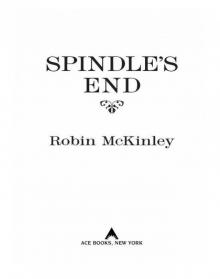 Spindle's End
Spindle's End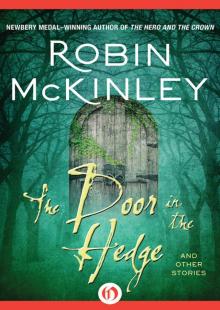 The Door in the Hedge: And Other Stories
The Door in the Hedge: And Other Stories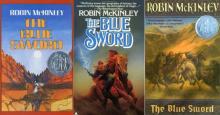 The Blue Sword
The Blue Sword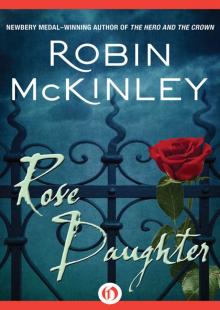 Rose Daughter
Rose Daughter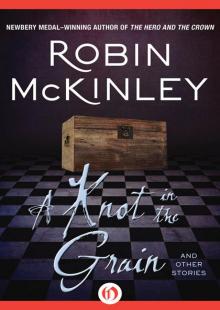 A Knot in the Grain and Other Stories
A Knot in the Grain and Other Stories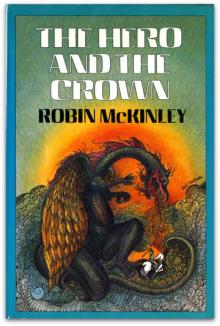 The Hero And The Crown
The Hero And The Crown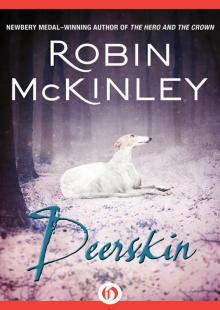 Deerskin
Deerskin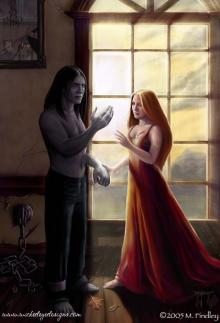 Sunshine
Sunshine Beauty: A Retelling of the Story of Beauty and the Beast
Beauty: A Retelling of the Story of Beauty and the Beast Shadows
Shadows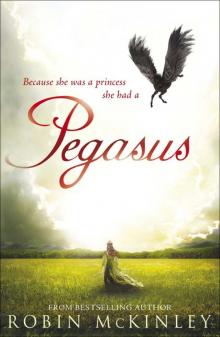 Pegasus
Pegasus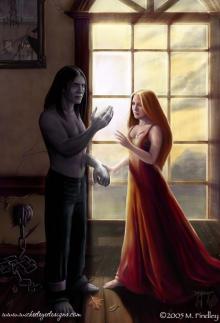 Chalice
Chalice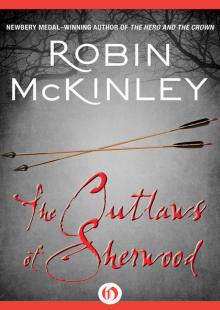 The Outlaws of Sherwood
The Outlaws of Sherwood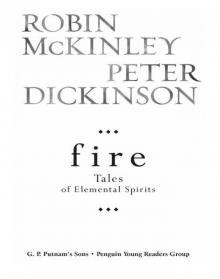 Fire: Tales of Elemental Spirits
Fire: Tales of Elemental Spirits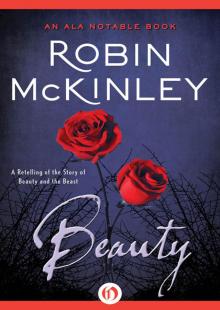 Beauty
Beauty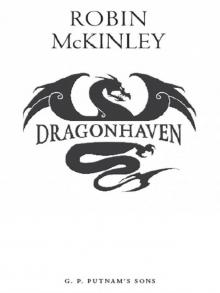 Dragon Haven
Dragon Haven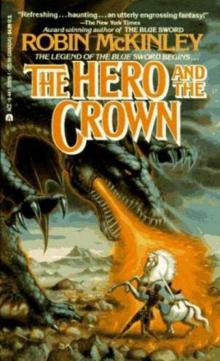 The Hero And The Crown d-2
The Hero And The Crown d-2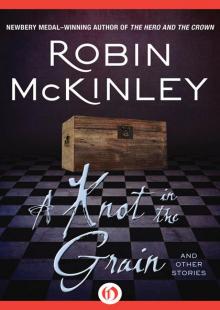 A Knot in the Grain
A Knot in the Grain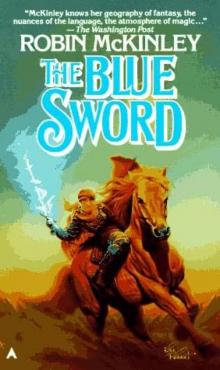 The Blue Sword d-1
The Blue Sword d-1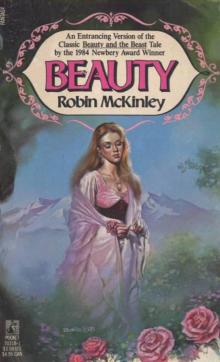 Beauty (v1.2)
Beauty (v1.2)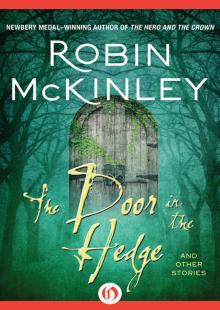 The Door in the Hedge
The Door in the Hedge